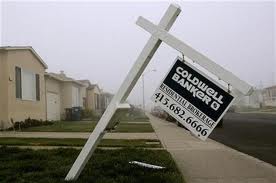 (WSJ) Home sales in December dropped by 1% from November, the National Association of Realtors reported on Tuesday, but still stood nearly 13% above the levels of one year ago. That means home sales have risen from the year-ago month for 18 straight months.
(WSJ) Home sales in December dropped by 1% from November, the National Association of Realtors reported on Tuesday, but still stood nearly 13% above the levels of one year ago. That means home sales have risen from the year-ago month for 18 straight months.
For 2012 as a whole, sales were up 9% to 4.65 million units, the highest annual total since 2007.
Prices, meanwhile, are picking up because the number of homes for sale continues to drop despite the sales volume gains. The number of homes for sale fell to 1.82 million at the end of 2012, an 8.5% drop from November and a 21.6% decline from one year earlier, the Realtors’ group said on Tuesday.
Here’s a breakdown of why inventory has continued to drop this year:
Many homeowners are underwater: More than 10 million homeowners owe more on their mortgage than their homes are worth, according to CoreLogic Inc. That pencils out to around 22% of homeowners with a mortgage, or 15% of all homeowners (since not every homeowner has a mortgage). Underwater owners aren’t likely to sell unless they need to move due to changing life (marriage, divorce) or financial circumstances, and they’ll take a hit on their credit for pursuing a short sale, where the bank allows the home to sell for less than the amount owed. Data from CoreLogic show that inventory has been the most constrained in housing markets where there’s the largest concentration of underwater borrowers.
Others don’t have enough equity to “trade up”: Another 10 million homeowners have less than 20% equity in their current residence, meaning they can’t easily “trade up” to their next house. Traditionally, homeowners have relied on home equity to make the down payment on their next home, and to pay their real-estate agent to sell their current home and buy their next one. These “under-equitied” homeowners—meaning they don’t have enough equity to make a move to a more expensive home—have added to the drag on inventory.
Everyone wants to buy at the bottom, but few want to sell: Even those people who do have plenty of home equity are likely reluctant to sell if they think prices will be higher tomorrow. Would you sell your largest asset today if you thought it might be worth 5% more next year? This helps explain why markets such as Denver and Dallas, which didn’t have huge housing bubbles and thus had smaller shares of underwater borrowers, have also seen double-digit inventory declines.



